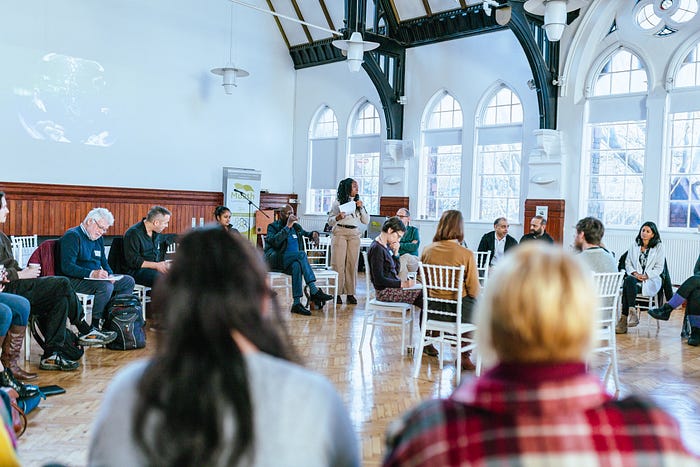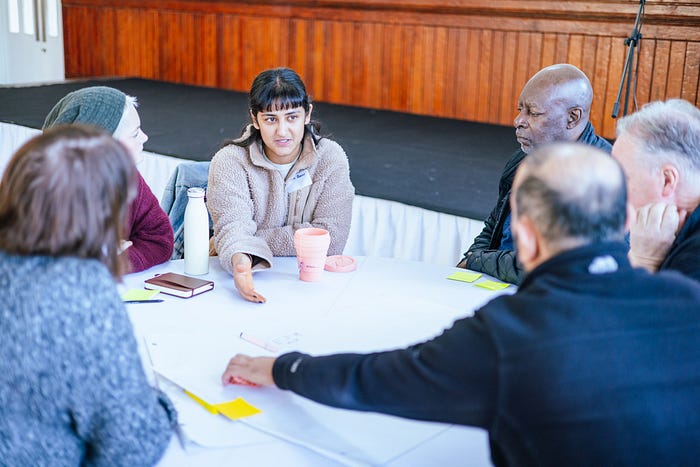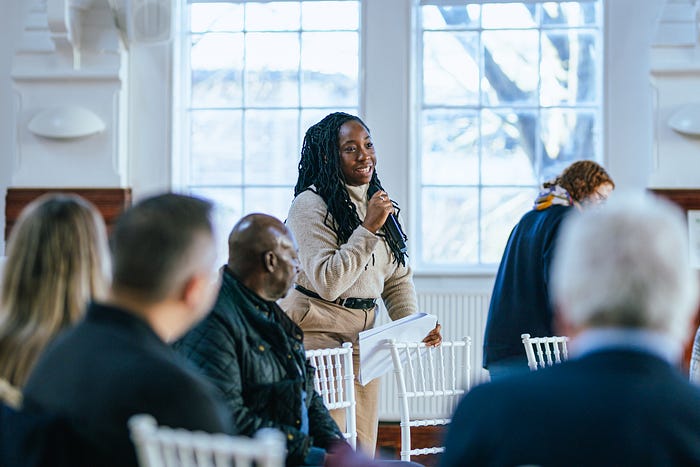Join us to imagine, strategise and build an economically just Birmingham, together.
As we arrive at the end of 2024, we are taking stock of Economic Justice Brum, supporting a growing movement in Birmingham, seeking to imagine, strategise and take action together, accelerating the pace of economic change in Birmingham. Economic Justice Brum is funded by Barrow Cadbury Trust.

Birmingham’s economy touches its citizens’ lives in dozens of ways each day. From access to safe, affordable housing, nourishing food, to good jobs, sustainable healthcare and other public infrastructures, economic change is possible on many fronts. The economy needs to transform to meet the needs of Birmingham’s communities — and we need strong relationships and a shared vision of the future to meet the scale of the challenge ahead of us.
Birmingham has experienced almost uninterrupted economic growth for the past 20 years. Economic output in Birmingham in 2022 stood at £35.4bn, making it the largest city economy in the UK outside of London. And yet it is a city with some of the most disadvantaged neighbourhoods in the country, some of the highest levels of unemployment nationally, plus a multitude of other significant indicators of economic inequality. It is clear to see that the problem underpinning Birmingham’s economic injustice is not an issue of needing to create more wealth, but rather an issue around the flow of wealth.
The economic story of the city needs to change, and change needs to happen with and for Birmingham citizens at the forefront. Economic Justice Brum (EJB), is supporting a growing movement of citizens, made up of community groups, civil society organisations, campaigners and communities impacted by economic injustice. We are connected by a shared commitment to economic justice, and we are joining together to support a shared vision to improve the lives of people in Birmingham.
Economic Justice Brum is a catalyst for realising economic justice, through creating a critical mass of knowledge and relationships and skills within our movement.

Supporting a movement for economic justice in Birmingham
In the process of building a movement, there are distinct phases. If we look through the lens of the Beautiful Trouble Movement Cycle, we might say we are in our uprising phase — there is an enduring crisis and we are witnessing a sea change in public opinion. Increasingly people are connecting the dots across unjust systems. And funders on the cutting edge of driving social change, such as Barrow Cadbury Trust, Thirty Percy and Joseph Rowntree Foundation are resourcing work that seeks to disrupt systems perpetuating this inequality.
For the past year and a half Economic Justice Brum has created a network that has been testing and iterating, experimenting and learning together through bi-monthly gatherings. As a group we have been examining economic systems and how they intersect with racial injustice, gender, climate, and therefore how they impact individuals and communities in different ways. We have been sharing wisdom, data, contacts and skills. We are building the mycelial network required for meaningful and lasting social change to take root and spread. Read our blog from the end of the pilot phase in May this year, to find out more.
People have come to our network through many routes: some work in the Council or Combined Authority, others are long-standing campaigners. Others were inspired by initiatives such as Shift Birmingham, the Poverty Truth Commission or Peer Researchers to use their own experience to create change for others.
Since May, we have been using NEON’s movement building framework, and their three approaches to social change, as the overarching structure holding the shape of each meeting. So far we have explored Personal Empowerment and Challenging Dominant Institutions, with topics and speakers spanning dreaming into an economy that is fit for purpose, extreme wealth and tax justice, co-operative building, campaigning for public assets to be kept in the hands of citizens, and much more.
We welcomed Elizabeth ‘Zeddie’ Lawal to the EJB facilitation team in July. Zeddie is an Associate of Huddlecraft (EJB’s facilitation partner) and co-founder of More Than a Moment, a createch agency and innovation lab with a mission to end civic, cultural and economic inequality in the 21st century. Alongside Anna, Zeddie has delivered sessions on the basics of economic principles, the colonial histories embedded in our economic stories and the beginnings of an EJB network manifesto. Zeddie brings creative flair, curiosity and a deep commitment to social change to the meetings and the movement.
“One of my key learnings is that culture alone cannot change the polycrisis that we exist in, economic inequality lays at the heart of the challenges that we are experiencing today. It is only by listening, radically, imagining and doing that we can transform the century that we exist in.”
Zeddie Lawal

The bi-monthly gatherings are the key network meeting point. And there are multiple strands of activity emerging and growing from the network that seek to broaden, deepen and spread social and economic systems change in Birmingham. The network has birthed the Huddles: seven purposeful, peer-led groups that are kicking off in January 2025. Ranging from child poverty to the creative economy to mutual aid to the rights of children and families experiencing the SEND system, there is a Huddle for everyone! Each Huddle seeks to develop a shared culture in which people understand that the economy is for everyone, and we all have a right to participate and input into the systems that impact us on a daily basis. Come along to our final open session in early January to find out more — sign up here. You can also read more about all 7 Huddles here. Registrations to participate closes on Monday 13th January.
Our next project is Participatory Systems Mapping, a method of creating a co-designed and shared visualisation of a system. Participants gather and feed data into a collective “map”, using a set of techniques and digital tools. The process identifies the places, people, services etc that influence any given system, and allows for the connections and relationships between these things to be made clearer. Naomi Bennett-Steele will be guiding a group of “gardeners” to build and tend to a map of Birmingham, in order for the movement to understand where and how the EJB movement might make the most impact in the city.
Looking ahead
Economic Justice Brum is constantly evolving, shaping and growing, and we understand that the landscape we find ourselves in is uncertain and complex. Over the last year and a half we have been preparing the foundations, strengthening the mycelium, collectively imagining the city we want to live in, creating visions for the movement and how we support it, articulating together what a thriving economy might look like for us in practice. The work is steady, the road is long, we need to stay resourced, healthy and rested. And, undoubtedly, there is a pressing and real urgency for change to happen, in practice. For alternatives to our broken economic systems to catch and disseminate.
In the coming months we will be shifting gears and focusing on building alternatives together, using the knowledge and skills gained to date. We will be learning from and connecting with local and global movements, organisations and changemakers and most importantly, building the prototype for Birmingham’s economic future.
In the New Year Economic Justice Brum will be:
- imagining, strategising and taking action on the experiments, initiatives and activities that we have been nurturing over the past year. Creating a participatory systems map, seeding peer-led learning and action huddles, building a movement manifesto, upskilling citizens, to name a few…
- cultivating the space for connections to take place. Platforming and amplifying where best practice is taking place and the economic alternatives already in motion.
- asking “how do we create a flow of accountability from point of design, to point of implementation — from prototype to practice?”
- intentionally and inclusively bringing the people whose voices need to be heard, into the conversation
- building a culture of collectivism, over individualism, with relationships at the heart of what we do. Giving hope and making space for connection, sharing and joy.
Economic injustice is alive and well in Birmingham, and it lives in everyone’s local and global story. Collectively, we are changing the narrative, by unlearning, undoing and holding ourselves and the city accountable to the future that we all deserve.
The next meeting is on Tuesday 28th January 2025. Email [email protected] to get involved.
If you are eager to meet, re-imagine and re-design our city in practice, we invite you all to attend the Beautiful Futures Summit 2025 on Friday 17th January from 10am—4pm. We are still looking for speakers so please email [email protected] if you are interested in playing a bigger role.
This blog was originally posted on Medium.
